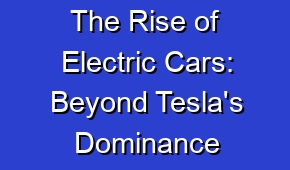Electric vs. Gas: The Ultimate Car Showdown

Discover the ultimate car showdown: electric vs. gas. Uncover the pros and cons of each fuel type and make an informed decision on which is right for you. From environmental impact to cost efficiency, delve into the key factors that will help you choose your next dream ride.
When it comes to the electric vs. gas: the car showdown, there are several factors to consider. One of the main advantages of electric cars is their environmental friendliness, as they produce zero emissions. Additionally, electric vehicles tend to have lower operating costs, thanks to their higher energy efficiency and lower maintenance requirements. On the other hand, gas cars offer a wider range of options and are more readily available, with an extensive network of fueling stations. They also provide a longer driving range, making them ideal for long trips or areas with limited charging infrastructure. However, with advancements in technology, the range anxiety associated with electric cars is gradually diminishing. Furthermore, government incentives and the growing number of charging stations are making electric vehicles a more viable option for many consumers. Ultimately, the decision between an electric or gas car depends on individual needs and priorities.
| Electric cars are more environmentally friendly compared to gas cars. |
| Gas cars offer a wider range and quicker refueling compared to electric cars. |
| Electric cars have lower maintenance costs compared to gas cars. |
| Gas cars generally have a higher top speed compared to electric cars. |
| Electric cars provide instant torque for quick acceleration, unlike gas cars. |
- Electric cars produce zero tailpipe emissions, reducing air pollution.
- Gas cars have a well-established refueling infrastructure, making them more convenient.
- The cost of electric charging is often cheaper than the cost of gas.
- Gasoline-powered vehicles have a longer driving range compared to most electric vehicles.
- Electric cars offer a quieter and smoother driving experience compared to gas cars.
What are the advantages of electric cars over gas cars?
Electric cars offer several advantages over gas cars. Firstly, they are more environmentally friendly as they produce zero emissions, helping to reduce air pollution and combat climate change. Additionally, electric cars are more energy efficient, converting a higher percentage of the energy from their batteries into actual power to move the vehicle. This can result in lower fuel costs and less dependence on fossil fuels.
| Environmental Impact | Cost Savings | Performance |
| Electric cars produce zero tailpipe emissions, reducing air pollution and greenhouse gas emissions. | Electricity is generally cheaper than gasoline, resulting in lower fuel costs and potential savings on maintenance. | Electric motors provide instant torque, delivering quick acceleration and smoother performance. |
| Electric cars contribute to reducing dependence on fossil fuels and promoting renewable energy sources. | Electric cars require less maintenance as they have fewer moving parts and do not need oil changes. | Electric cars offer a quieter and more refined driving experience with less vibration and noise. |
| Battery technology advancements are increasing the range and charging speed of electric cars. | Government incentives and tax credits are often available for purchasing electric vehicles. | Electric cars can be equipped with advanced technology features and have potential for autonomous driving. |
What are the disadvantages of electric cars compared to gas cars?
While electric cars have many benefits, there are also some disadvantages to consider. One major drawback is the limited range of electric cars compared to gas cars. Electric vehicles typically have a shorter driving range and require more frequent charging, which can be inconvenient on long trips. Another challenge is the availability of charging infrastructure, as it may be less widespread than gas stations in some areas.
- Limited driving range: Electric cars generally have a shorter driving range compared to gas cars. This means that they need to be charged more frequently, which can be inconvenient for long trips or when there are limited charging stations available.
- Longer charging time: Charging an electric car takes significantly longer than refueling a gas car. While gas cars can be refueled in a matter of minutes, electric cars can take several hours to fully charge, depending on the charging infrastructure and battery capacity.
- Higher upfront cost: Electric cars are generally more expensive to purchase compared to gas cars. The cost of batteries, which are a major component of electric vehicles, contributes to the higher price. Although there may be potential long-term savings in terms of lower fuel and maintenance costs, the initial investment can be a barrier for some consumers.
Are electric cars more expensive than gas cars?
Electric cars generally have a higher upfront cost compared to gas cars. This is mainly due to the cost of the battery technology used in electric vehicles. However, it’s important to consider the long-term savings potential of electric cars. They typically have lower operating and maintenance costs, as electricity is generally cheaper than gasoline and electric motors have fewer moving parts that require maintenance.
- Electric cars are generally more expensive to purchase upfront compared to gas cars.
- However, electric cars have lower operating costs due to lower fuel and maintenance expenses.
- Government incentives and tax credits are available for electric car purchases, reducing the overall cost.
- Over time, as the demand for electric cars increases, the prices are expected to decrease.
- Electric cars offer long-term savings potential as electricity prices are generally more stable compared to fluctuating gas prices.
Which type of car is better for long-distance driving: electric or gas?
When it comes to long-distance driving, gas cars currently have an advantage over electric cars due to their longer range and the widespread availability of gas stations. Gas cars can be refueled quickly, allowing for uninterrupted long trips. However, with the development of fast-charging infrastructure and improvements in battery technology, electric cars are becoming more viable for long-distance travel.
| Electric Cars | Gasoline Cars |
| Lower operating costs due to cheaper electricity prices. | More widespread availability of gas stations. |
| Lower maintenance costs due to fewer moving parts. | Higher driving range without the need for recharging. |
| Environmentally friendly with zero tailpipe emissions. | Quick refueling time compared to recharging electric cars. |
What is the environmental impact of gas cars compared to electric cars?
Gas cars have a significant environmental impact due to their emissions of greenhouse gases and air pollutants. The burning of gasoline releases carbon dioxide, a major contributor to climate change, as well as other pollutants that can harm air quality. In contrast, electric cars produce zero tailpipe emissions, resulting in a much lower environmental impact.
Gas cars have a higher environmental impact compared to electric cars due to their emissions of greenhouse gases and air pollutants.
Which type of car is more suitable for city driving: electric or gas?
For city driving, electric cars are often considered more suitable than gas cars. This is because electric vehicles excel in stop-and-go traffic, where their regenerative braking systems can help recharge the battery. Electric cars also produce less noise pollution, contributing to a quieter and more pleasant urban environment.
When it comes to city driving, electric cars are more suitable due to their zero emissions and quieter operation.
What is the future outlook for electric cars versus gas cars?
The future outlook for electric cars appears promising. As governments around the world implement stricter emissions regulations and aim to transition to cleaner transportation options, the demand for electric vehicles is expected to increase. With ongoing advancements in battery technology and charging infrastructure, electric cars are likely to become more affordable, have longer ranges, and offer even greater convenience for drivers.
1. Increasing Market Share of Electric Cars
Electric cars are expected to gain a larger market share in the future. With advancements in battery technology, electric vehicles (EVs) are becoming more affordable, efficient, and have longer driving ranges. Governments around the world are also implementing policies to promote the adoption of electric cars, such as tax incentives and stricter emissions regulations. As a result, the demand for electric cars is projected to increase, leading to a higher market share compared to gas cars.
2. Improvements in Charging Infrastructure
One of the key challenges for electric cars is the availability of charging infrastructure. However, significant progress has been made in developing a robust charging network. Governments and private companies are investing in the installation of charging stations, both at public locations and in residential areas. Additionally, fast-charging technologies are being developed to reduce charging times. These improvements in charging infrastructure will further enhance the convenience and practicality of electric cars, making them a more attractive option for consumers.
3. Transition towards Renewable Energy Sources
The future outlook for electric cars is closely tied to the transition towards renewable energy sources. As the electricity grid becomes greener, the environmental benefits of electric cars will increase. The use of renewable energy, such as solar and wind power, to charge electric vehicles will significantly reduce greenhouse gas emissions and dependence on fossil fuels. This transition is already underway in many countries, and as it progresses, the advantages of electric cars over gas cars will become even more evident, leading to a shift in consumer preference towards electric vehicles.





















